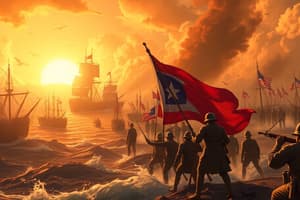Podcast
Questions and Answers
What was a key economic motive behind American imperialism in the late 19th and early 20th centuries?
What was a key economic motive behind American imperialism in the late 19th and early 20th centuries?
- Protecting American industries from foreign competition
- Expanding the US Navy to become a global power
- Seeking new markets for American-made goods (correct)
- Providing social services to improve the lives of the poor and marginalized
Which of the following was NOT a significant social motivation for American imperialism?
Which of the following was NOT a significant social motivation for American imperialism?
- Protecting American citizens living abroad (correct)
- A sense of national duty to spread American values
- The belief in the civilizing mission of the United States
- A growing interest in exploring and settling new lands
What was the primary result of the Spanish-American War in terms of American imperialism?
What was the primary result of the Spanish-American War in terms of American imperialism?
- The acquisition of overseas territories like Puerto Rico, Guam, and the Philippines (correct)
- The annexation of Cuba, leading to increased US influence in the Caribbean
- Increased American trade with European powers, disrupting their colonies
- The establishment of a US naval presence in the Pacific Ocean
Which of the following best describes the Progressive Era in the United States?
Which of the following best describes the Progressive Era in the United States?
Identify a key figure who was instrumental in the Progressive Movement.
Identify a key figure who was instrumental in the Progressive Movement.
Which of the following was a major focus of Progressive Era reforms?
Which of the following was a major focus of Progressive Era reforms?
What was the primary goal of the initiative, referendum, and recall processes advocated by the Progressive Movement?
What was the primary goal of the initiative, referendum, and recall processes advocated by the Progressive Movement?
What is a key difference between American Imperialism and the Progressive movement?
What is a key difference between American Imperialism and the Progressive movement?
Flashcards
American Imperialism
American Imperialism
The expansion of American influence globally in the late 19th and early 20th centuries.
Spanish-American War
Spanish-American War
A conflict in 1898 resulting in U.S. acquisition of territories like Puerto Rico and the Philippines.
Economic Motives of Imperialism
Economic Motives of Imperialism
Desire for new markets, raw materials, and investment opportunities abroad.
Political Motivations for Imperialism
Political Motivations for Imperialism
Signup and view all the flashcards
Progressive Era
Progressive Era
Signup and view all the flashcards
Key Figures in Progressivism
Key Figures in Progressivism
Signup and view all the flashcards
Economic Reform
Economic Reform
Signup and view all the flashcards
Reforms of the Progressive Movement
Reforms of the Progressive Movement
Signup and view all the flashcards
Study Notes
Imperialism (Late 19th and Early 20th Centuries)
- American imperialism surged in the late 19th and early 20th centuries, driven by economic, political, and social factors.
- Economic motivations included seeking new markets for goods, accessing raw materials, and expanding investment opportunities.
- Political motivations included gaining global power and influence, promoting American exceptionalism, and competing with European powers in the colonial race.
- Social factors involved a belief in the "civilizing mission," a sense of national duty, and a desire to explore and settle new lands.
- The Spanish-American War (1898) significantly expanded American influence, leading to the acquisition of Puerto Rico, Guam, and the Philippines.
- The debate over Philippine annexation highlighted the ethical dilemmas of imperialism, pitting the belief in a civilizing mission against concerns regarding self-determination.
Progressive Era (Early 20th Century)
- The Progressive Era (roughly 1890-1920) was a period of social and political reform in the United States.
- Progressives aimed to address issues stemming from industrialization and urbanization, including poverty, inequality, corruption, and unsafe working conditions.
- Progressive reformers sought to improve society through actions like establishing worker protections, ensuring consumer safety, and implementing political reforms.
- Key figures included Theodore Roosevelt, Woodrow Wilson, and Jane Addams.
- Key Progressive Era issues addressed included:
- Economic reform: Regulating monopolies, improving working conditions, and protecting consumers.
- Political reform: Reducing government corruption, improving voting rights, and increasing public participation in governance.
- Social reform: Improving the lives of the poor and marginalized, including African Americans, immigrants, and women.
- The initiative, referendum, and recall were Progressive reforms aimed at increasing public involvement in government.
- Progressivism encompassed various approaches and philosophies, sometimes overlapping or conflicting.
Connections:
- Imperialist expansion spurred some Progressive reforms, as the need to manage newly acquired territories led to increased pressures to regulate businesses and maintain social order.
- Both imperialism and progressivism shared underlying themes of American exceptionalism and a belief in the United States' role in improving society.
- The era's emphasis on social justice and reform coincided with global efforts to improve living standards and promote fairness.
Studying That Suits You
Use AI to generate personalized quizzes and flashcards to suit your learning preferences.




